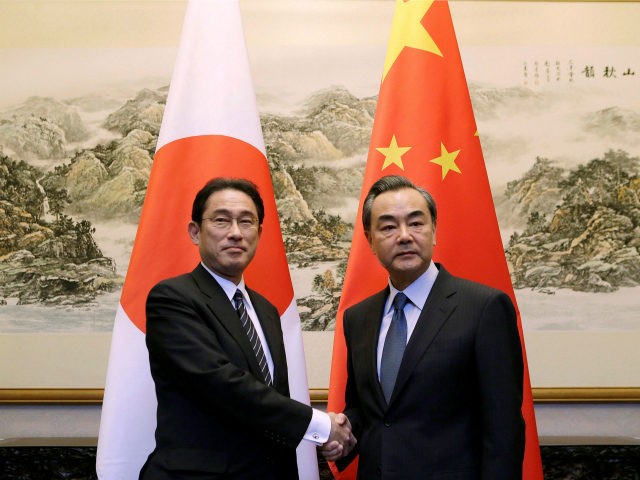Japan’s Nikkei Asian Review reports Monday that Chinese Foreign Minister Wang Yi’s confrontational attitude towards visiting Japanese Foreign Minister Fumio Kishida over the weekend has been “deeply irritating” to high-level Japanese officials.
Kishida was in Beijing Saturday and Sunday to discuss improving ties between the two nations, which have been historically strained and worsened by Chinese belligerence in the East and South China Seas. As recently as March, Japanese legislators were looking for ways to bring China to international court over their attempts to usurp sovereignty over Japan’s Senkaku Islands, located in the East China Sea. China has claimed the islands and established a largely-ignored Air Defense Identification Zone (ADIZ) over the islands.
Following the meeting between Wang and Kishida — in a visit that was the first of its kind in four years — Kishida’s spokesperson told reporters their conversation was “frank and candid.” Nikkei notes that Kishida denied ever having described China as an overt maritime threat, instead saying that China’s moves in the region “are simply reported by the media.” China has repeatedly attacked Vietnamese vessels located in their respective national territories and stocked artificial islands in the Spratly and Paracel Islands with military equipment.
In response to Kishida’s visit, the Chinese government released a list of four demands upon the Japanese government before they can truly have diplomatic relations. Beijing demands that Japan “face up to and reflect upon the history and follow the one-China policy” (that is, not acknowledge Taiwanese sovereignty); “have a more positive and healthy attitude toward the growth of China”; “enhance equal-footed and pragmatic cooperation with China”; and “cast aside the confrontation mentality and work with China to maintain peace, stability and prosperity of the region.” The government did not elaborate on any of these points.
These demands, Nikkei insists, are what has Japanese officials so “deeply irritated.”
In its state-run media, China has continued to use stern language against Kishida and Japan generally, accusing the nation of “hyping up the South China Sea issue” as part of a campaign of “unwanted finger-pointing, irresponsible and erroneous moves.” State news outlet Xinhua warns Kishida off of “empty talk.”
Kishida has, indeed, challenged China’s claims in the South China Sea, which until recently were supported by no other country internationally. Currently, only the governments of Gambia, Laos, and Cambodia have expressed support for Chinese sovereignty in the region. The territory China claims overlaps with the borders of Taiwan, Brunei, Vietnam, the Philippines, and Malaysia. The Philippines has brought a case to the Permanent Court of Arbitration at The Hague to defend its borders, which the Chinese government has vowed to ignore regardless of outcome.
“Candidly speaking, a rapid and opaque increase in (China’s) military spending and unilateral attempts to change the status quo in the East and South China Seas under the aim of building a strong maritime state are having not only people in Japan, but countries in the Asia-Pacific region and the international community worried greatly,” Kishida said in a speech on April 25.
Meeting with Thai leaders on Monday, Kishida continued to highlight the issue, encouraging the members of the Association of Southeast Nations (ASEAN), which includes the nations affected by China’s imposition, to “be united in responding to China’s assertiveness in the South China Sea.”
The Japanese government recently signed an accord with the Philippines to provide the government with further ammunition, in addition to sending a submarine and missile destroyer to Philippine waters in a clear message to China to keep its military within its borders. Japan has also sent warships to Vietnam and raised the topic of Chinese imperialism at a meeting with leaders in East Timor, a small regional power.

COMMENTS
Please let us know if you're having issues with commenting.